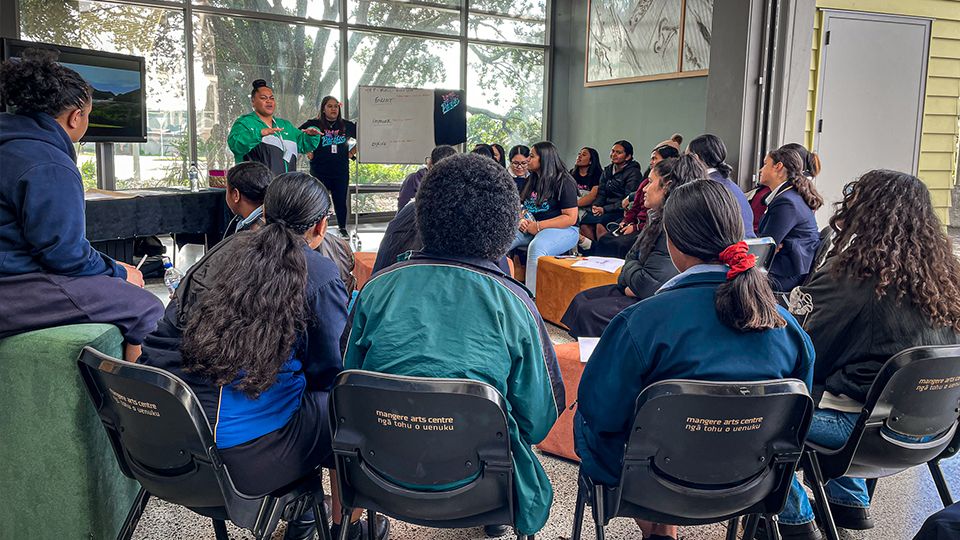

Marie Laufiso, Dunedin councillor and mayoral candidate.
Photo/Cr Marie Laufiso Facebook/RNZ Nate McKinnon
Local govt elections: Marie Laufiso calls for funding changes
Dunedin’s first Pasifika councillor says the rates system is inadequate and wants a reassessment of the nation’s local government funding model.


Six60: Back to their roots with new album ‘Right Here, Right Now’

Sāmoa backs visa-free travel petition as Pacific leaders reject ‘mass migration’ concerns

Tackling a health emergency: Pacific Tag tournament raises dementia awareness


Six60: Back to their roots with new album ‘Right Here, Right Now’

Sāmoa backs visa-free travel petition as Pacific leaders reject ‘mass migration’ concerns

Tackling a health emergency: Pacific Tag tournament raises dementia awareness
A Pacific councillor in Dunedin says the city must move away from short-term thinking and reconsider how councils are financed, warning that the current rates system is inadequate.
Marie Laufiso says the rates set in the long-term plan are necessary for infrastructure, particularly for local water services. But she contends that the overall system needs reform.
“I believe the systems are broken and we actually need to change the conversation,” she says. “Instead of arguing with ratepayers or trying to persuade them that we need rate increases, we need to change the whole system.”
In an interview on Pacific Mornings, Laufiso highlighted the lack of a comprehensive review of rate affordability since the 2007 Shand Report and suggested that New Zealand consider alternative financing models, such as off-balance sheet fiscal agencies used in other countries.
Her campaign is founded on the idea of seven generations planning, which emphasises a long-term approach that prioritises vulnerable families, seeks to end homelessness, and reframes housing as a public good and a human right.
“If we could actually focus on the needs of our most vulnerable… If we could centre our strategic planning for 200 years, 50 years, not 10 years as we do, I think we would improve things for everyone, not just people who already enjoy the status quo.”
Listen to Marie Laufiso's interview below.
Laufiso’s priorities include equitable investment in children and young people, eradicating food banks, and shifting the council’s focus from managing growth to building resilience.
“I think we can have lots of conversations that are really, really forward-looking and really grapple with ecological economics. Because the system that we’re in now just relies on booms and busts. And it’s got to stop because it’s wasting the potential of so many people.”
Her approach to governance advocates for consensus-based decision-making.

Laufiso says her priorities include ending homelessness and reframing housing as a public good. Photo/file
“I did say that if it was up to me, we would go to the marae… and stay there until we achieve consensus. Because at council, of course, it all comes down to the vote. You have the majority rules. Whereas I think we need to take our time sometimes.”
Her philosophy is rooted in the concept of kōtahitaka, building togetherness through shared values of service, care for people, and care for the environment.
“We have shared values of service, collective service to effect systems change: aroha ki te tangata, care for Papatūānuku, and a real commitment to unity and working together.
“Even if we do not agree with everything our other team members say, do or believe, we still believe in coming together to effect real change, and in valuing and investing fully and equitably in babies, children and young people first, because there is so much healing and so much need among the young.”
Reflecting on her three terms since 2016, Laufiso says the council has achieved mixed results. Declaring a climate emergency in 2019 was a milestone, but she believes that progress towards carbon-zero targets has since slowed.

Dunedin councillors have passed three resolutions in support of Palestine, which Laufiso counts among key achievements. Photo/file
“We’ve had some disappointments. On the other hand, we’ve successfully passed three resolutions in support of Palestine. So… some days it’s a good day at the office, and some days it’s not. But we carry on.”
She also highlights the need to repair relationships, especially with the University of Otago, the city’s second-largest employer, which she says has not always received adequate support from the council.
Elected in 2016 as Dunedin’s first Pasifika councillor, Laufiso takes pride in her heritage and says that her political journey is built on a family legacy of service.
She believes that the council chamber does not reflect the city’s demographics, particularly its younger generation.

Laufiso wants councils to invest fully and equitably in young people, saying their voices are missing from decision-making. Photo/file
At the last election, many rangatahi told her that they felt “too young and had time” to engage later.
“Aaron Hawkins [former mayor] was the only councillor under 40 years of age,” Laufiso says.
“There needs to be at least a third to a half of young people under 45… that would really change the look and feel of the city.”
Now running for mayor, Laufiso frames her campaign around the principles of seven generations planning and emphasises the urgent need to overhaul what she describes as a broken funding system.
LDR is local body journalism co-funded by RNZ and NZ On Air.
